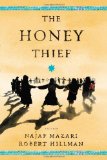![]()
 Once upon a time, in a Hazarti village in the wilds of Afghanistan, lived a boy without any common sense. His father and mother loved him but despaired of him. One day a traveling merchant passed through the village, a man burdened with books written in English and Dari that he had been unable to unload on anyone. He manages to trade the books to the boy who lacked common sense. The boy sat in the orchard and read, while marauders stole all his father’s figs from the trees. He stole candles from his mother’s supplies to stay up and read. “If it were not against God’s law, I would tie him to a tree for the wolves to enjoy,” said his mother to his father. (p. 154) But the boy, really a young man, began to read the books aloud, and his family gathered every evening to listen to him.
Once upon a time, in a Hazarti village in the wilds of Afghanistan, lived a boy without any common sense. His father and mother loved him but despaired of him. One day a traveling merchant passed through the village, a man burdened with books written in English and Dari that he had been unable to unload on anyone. He manages to trade the books to the boy who lacked common sense. The boy sat in the orchard and read, while marauders stole all his father’s figs from the trees. He stole candles from his mother’s supplies to stay up and read. “If it were not against God’s law, I would tie him to a tree for the wolves to enjoy,” said his mother to his father. (p. 154) But the boy, really a young man, began to read the books aloud, and his family gathered every evening to listen to him.
Another time, there came a man from England to photograph a snow leopard, an animal the villagers don’t really believe exists. They give him a name in the local dialect that means “Try Again” when he persistently returns, but a man from the village takes him high up the treacherous mountain, where the sight of Russian planes flying overhead causes the guide to hurry down in fear for his family.
The Honey Thief is a fascinating look at a people with an oral culture of story-telling that is being lost. A collection of loosely-connected tales with some recurring characters from the Hazara people of Western Afghanistan, the book introduces the reader to a more nuanced view of this war-torn country than can be gained from nightly news bulletins. By turns delightful and depressing, The Honey Thief
takes us into the hearts of the people of this village, their dreams and hopes, their despair, their courage. Author and local Najaf Mazari, working with journalist Robert Hillman, wrote down some of the stories of his people, who come from a tradition of oral storytelling. The stories are a blend, a little folklore, a lot of recent history.
On top of that, the book ends with the most thorough recipes I’ve ever read. In explaining the best lamb for Qorma, he says, “Away from Afghanistan, you know, I never enjoy meat of the quality I knew in my village. But this is the world. Not everyone can find freshly killed Karakul lamb. A pity.” (p 269) Or, later, “I thank God for the invention of the chicken.” (p. 284) These are both from the comments ahead of the recipes, which include instructions such as “What you will need: A chicken, above all. A fat, happy chicken–one that has spent her life eating harlequin beetles and earthworms and grass seeds,” (p 284) or “Use the big pot that you have so much trouble fitting into your dishwasher for this,” (p.285) or “Four big tomatoes. Not almost big but truly big. And very ripe,” (p. 269) or “Fresh yoghurt. This must be proper yoghurt, not that foolish yoghurt that is sometimes sold with bananas in it and strawberries and sugar.” (p. 273)
I thoroughly enjoyed this book and highly recommend it. I recently read an article that posited that reading makes us more empathetic, better able to understand others points of view. (To which I said, well duh! Of course it does!) This is one of those books that does that, helps us to see what it might be like to grow up in a small mountainous village where all the things most precious in life reside–family, good food, friends to help us through the long winters.
This sounds fascinating! I’ve pinned it to my book wish list so I’ll remember to look for it.